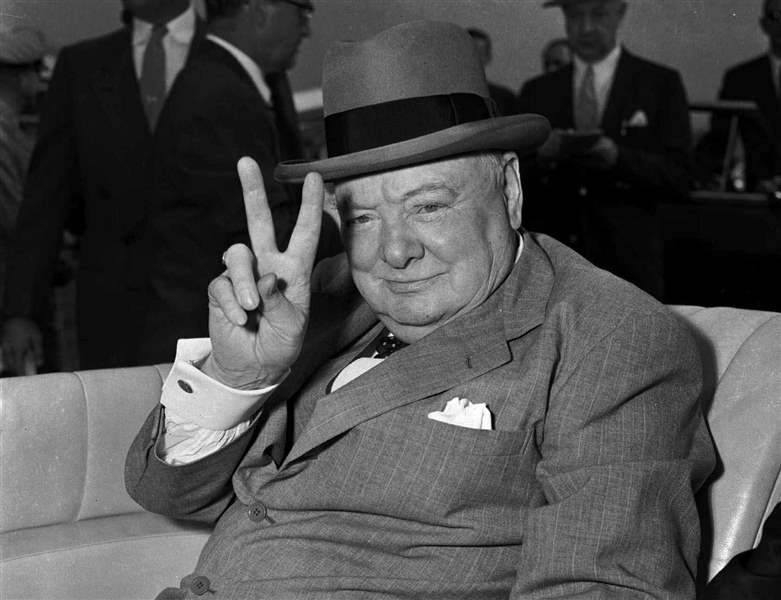
The Left's war on thought
1/26/2018
British Prime Minister Winston Churchill is remembered for many things, but he should be best remembered for his committment to critical thought.
ASSOCIATED PRESS

Keith Burris
Thanks to a friend who gave me the book Churchill & Orwell, by Thomas Ricks, and to the new film Darkest Hour, I am rediscovering Winston Churchill — his wit, his passion for words and forceful, clear writing, his courage, and, perhaps most of all, his independence, source of the courage.
I suppose there have been as many books written on Churchill as Lincoln, and multiple movie and TV portrayals. But the charm and now iconic nature of the man should not blind us to two things: First, that his independence cost him dearly. He stood alone for most of his public life. Even in power he was often alone. He was reviled by many for much of his career. Utterly reviled. And, second, he saved Western civilization. That is, he lead, not just militarily but spiritually, the West’s fight for its own life.
VIDEO: Against the wind
What was the link between loneliness and exquisite leadership? The same quality that characterized and animated Orwell — thought. Critical thought. Freedom of thought.
For Orwell, journalism was an unending and tireless exercise in critical thought.
If Churchill saved the West from one sort of totalitarianism, Orwell warned us of another — the war on thinking.
Our culture of distraction (one part white noise, one part social media narcissism, and one part pornographying of bodies and things) is a running war on thought. So is the political right’s denial of science and its lack of respect for Mother Earth. But if the right dismisses scientific knowledge, the left makes war on thought itself.
What is often called political correctness, a term that long ago wore out its welcome, is the impulse to stifle thought that is not pre-cooked and might lead to a place we do not want to go — thought that is unaligned. And the left, because it controls both popular and academic culture, and much of the media, which falls between the two cultures, usually triumphs in this assault. Debate is stifled; the chilling effect is felt.
Two weeks ago The Blade published an editorial that touched two third rails of American self awareness: race and Donald Trump. That combination is incendiary if one does not recite the expected social catechisms.
The first suggestion of the editorial was that racism, as Daniel Patrick Moynihan wrote of deviancy, has been “defined down.” Or perhaps it is better to say that racism has been defined out. The words racist and racism no longer have specific meanings, so the terms are used in a loose and often pernicious way — as dismissive labels or slander per se. If to be a white male is to be a racist, what good is the term, and what hope is there for white males?
Since the entire thrust of what we are now taught about race and racism is that the terms should continue to be broadened and indiscriminately applied, this was a disturbing suggestion to many — invoking nothing less than wrath.
The suggestion the editorial made about Mr. Trump was even more disturbing to some: It was that demonizing him may be intellectually lazy and, in Sen. Rand Paul’s phrase, “not useful.” If one wants a Dreamers bill, or an infrastructure plan, perhaps calling the president a racist is a self-indulgent side show.
Well, hell hath no fury like the fury invoked by the proposition that Donald Trump might not be a racist, that his heart might not be something we could actually know, and that, if we did if would make little practical difference to his ability to do his job. (Other factors, like relationships with senators or understanding of the legislative process, factors far less emotionally charged, might make a much more substantive difference, but these are of no interest to the Trump haters. Their hate knows no bounds and no reason.)
So what happens if you “think outside the box,” about matters of identity conviction, elevated to an almost theocratic level? You get called out. You get called a racist yourself, and maybe even, for good measure, homophobic or misogynistic.
And the effect is chilling. It makes you think twice about further questioning the assumptions or convictions of the good, right thinking people.
For when we speak of moral McCarthyism, or the New McCarthyism, we are referencing what Joe McCarthy did to those who questioned him in the 1950s. He slandered them. The idea was not just to silence them, but to damage their reputations. To hurt them. To make them defend their good names.
Nothing is more indefensible than to impugn the integrity of your opponent. But nothing is more effective.
Ideological thinking, identity opinion, is anti-thought. It’s all about what you cannot — must not — think or say.
But, as Jordan Peterson has noted, you have to risk loneliness, dissent, offense, in order to think.
As Prof. Peterson has also said, quite movingly, ideas, to be alive, must be possessed by people — modified and adapted and internalized individually. They cannot be allowed to be in possession of people.
Orwell was a committed socialist who bucked his party and was ostracized for it. Churchill, who hated socialism, wandered from party to party, never really finding a home. He found his only true home in the ideas he inhabited and the words he chose to carry and adorn them. “All the great things are simple,” he once wrote, “and many can be expressed in a simple word: freedom, justice, honor, duty, mercy, hope.”
He also said, “Kites rise highest against the wind, not with it.”
Keith C. Burris is editorial page editor of The Blade. Contact him at kburris@theblade.com or 419-724-6266.